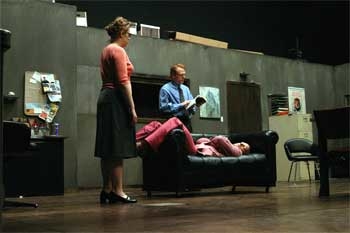
- San Francisco Chronicle February 14, 2020
- The Times of London May 10, 2012
- The New York Times December 16, 2010
- The New Yorker September 27, 2010
- New York Magazine October 6, 2010
- The New York Times October 6, 2010
- The New York Times February 5, 2010
- The Boston Globe May 15, 2009
- The Sydney Morning Herald December 28, 2009
- The Sydney Morning Herald May 19, 2009
- The Chicago Tribune November 17, 2008
- Time Out Chicago November 13-19, 2008
- Chicago Sun-Times November 15, 2008
- The Irish Times October 4, 2008
- The Independent October 3, 2008
- Irish Times September 29, 2008
- ArtForum: Best of 2007 December 1, 2007
- The New York Times Magazine December 9, 2007
- The New York Times September 16, 2007
- The Village Voice September 12-18, 2007
- The Bulletin September 4, 2007
- Publico July 4, 2007
- Die Presse June 17, 2007
- Klassekampen December 12, 2006
- Variety October 1, 2006
- Neue Zürcher Zeitung August 28, 2006
- Tages-Anzeiger August 28, 2006
- The New York Times July 16, 2006
- Het Parool June 16,2006
- 8Weekly June 16, 2006
- Trouw June 16, 2006
- Walker Art Center interview June 8, 2006
- NRC Handelsblad June 2, 2006
- De Volkskrant May 29, 2006
- Le Soir May 24, 2006
- Yale Alumni Magazine November/December 2005
Under The Spell Of A Novel
A day in the office becomes an entire life. Elevator Repair Service’s “Gatz” at the Theaterspektakel demonstrates the nature of story.
by Stefan Busz
ZURICH — the man enters the office, switches the light on, hangs up his raincoat. Then he sits at his desk, starts the computer, waits. The man gropes for a file on the table, pulls a paperback out of the pile and begins, somewhat absently, to read aloud from the first chapter. Other people come into the office and quietly start working: they bring mail, look for files, make themselves coffee. But the man reads on and on. The other employees look over his shoulder occasionally. Later they themselves begin to speak in the language of the book. So it goes, page after page. By the end the table is cleared. The computer, which has never worked, has long ago been taken away by a technician. Even the other people are gone now. The light goes out. But not until the man speaks his last sentence does the story end.
A day in the office becomes an entire life. “Gatz,” the stage adaptation of Scott Fitzgerald’s novel “The Great Gatsby” by the New York company Elevator Repair Service, starts (in the long version) on Friday at 6pm in the Aktionsraum of the Rote Fabrik. The performance lasts a solid seven-and-a-half hours, and when you walk out into the night at 1:30 in the morning you are leaving a place that has become very familiar. Because during that time you become involved in a world — the world of a book. Page by page a game of transformation unfolds. Bystanders become participants in a reality that exists only, word for word, in a novel.
An Invitation
So it goes for the people onstage. Each one finds his role. They experience something like what the narrator Nick experiences — he too arrives as a newcomer and falls under the spell of the great Gatsby.
This happens to the people in the auditorium too: no one can pull away from this performance. Every scene leads us closer to the story — and when an older man who bought his granddaughter a cheese sandwich outside during the intermission stands on stage and plays Gatsby’s father, this is a beautiful image. Because it shows us the true nature of theater: an invitation for everyone.
You don’t have to be familiar with the author. You don’t have to have read his book. You don’t have to know anything about deconstruction in the theater or any other art mumbo-jumbo. (You do have to know a little English in this case.) Only the first half-hour is tiring. After that we are wide awake the whole long time. Then something arises out of the familiar day-to-day of the office which astonishes us in its design: Here the clock stands still, but the carriage return on a typewriter tolls the hour. Here the mail is being processed, but the sorted pages can be read as a novel about the rise and fall of a man. In this play there is hardly any movement, but signs of keenest love reveal themselves on stage. Only a small adjustment is necessary, the change of a suit or a dress, and suddenly the characters are in a different situation — Jim Fletcher, the Gatsby character, then radiates in his pink fabric.
Extremely playful
In short, an exremely simple presentation. Director John Collins, 11-year member of the avantgarde New York collective The Wooster Group, limits himself in his staging to Fitzgerald’s language. The entire piece evolves out of the stream of the narration. But “Gatz” is extremely playful, artful not only with images but also with sound. The sound technician sometimes joins in the action onstage: his coffee cup, which has been standing on his desk, becomes a prop. Anything anywhere might fall into the grip of the story in this show.
Shortly before the finish Scott Shepherd, who for the longest time has been reading sentence after sentence, chapter after chapter out of “The Great Gatsby,” puts the book aside, and now he is fully transformed into the narrator Nick. On his own he recites the final passages, which speak of the end of an era. We want to stay a little longer in this office that represents our novel too. But the nightbus is already waiting outside. Back into an ahistorical time…